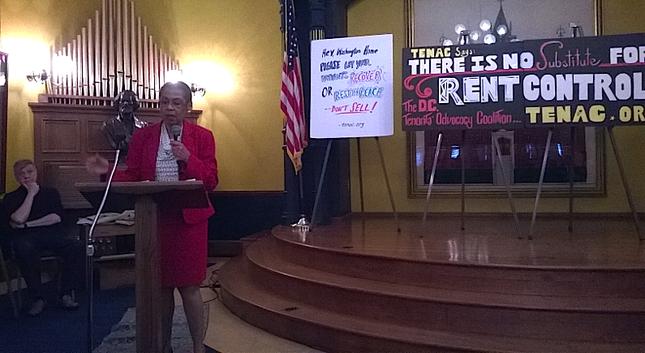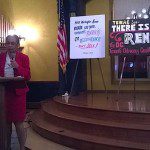Tenants’ Advocates Forum: Local Politics in Action
By • May 26, 2016 0 1356

It’s less than a month until the June 14 D.C. Primary Election, so it’s not too surprising that candidate forums and debates and the like are in full swing across the District.
As political events go, these forums in front of citizens’ groups, ANCs and advocacy organizations come and go. Traditionally in this town, few people pay intense attention, what with Memorial Day coming up and summer, after days of rain, about to start at last.
The many forums in other locations may account for the fact that the 2016 candidates’ forum held by TENAC, the D.C. Tenants Advocacy Coalition, at Sumner School last week was often a disjointed if enthusiastic affair, with candidates going in and out, apparently from forum to forum. But with TENAC’s redoubtable chairman Jim McGrath as host, the event also offered up a small corner of local politics and activism in action — this in a time of great and often furiously fast changes in the District.
TENAC represents those residents of the District who rent, those who are not home or condo owners. According to TENAC, these folks make up two thirds of the city. They are in the eye of the storm when it comes to the issue of affordable housing, with its unwieldy and often misleading definition and standards, not to mention rent control, which tenants see as a program under attack. TENAC is also involved with the rights — housing, rent control, care facilities — of the city’s elderly, aging and transitioning population, likewise facing challenges in this age of growing prosperity for some, though far from all.
The meeting was a mixed bag, a little awkwardly constructed to coincide with a presentation by a group opposing the sale of the Washington Home and Community Hospices to Sidwell Friends School. Candidates were asked if, given the opportunity, they would use eminent domain as a tool to address that issue. The proposed and impending sale of the Washington Home has become controversial, highlighting the plight of the city’s elderly residents and their families.
The turnout at the forum by candidates was sporadic. Ward 2 Council member Jack Evans, who is up for reelection but running without opposition, showed up to note his long-time support for tenants’ rights, as did Delegate Eleanor Holmes Norton. Among the signs and flyers were “Dump the Trump” and “There Is No Substitute for Rent Control.” McGrath said that, while the city is booming financially, rents are going “through the roof” and “renters are suffering tremendously.”
“We have to make sure that we keep rent control secure,” he said.
Some candidates suggested that the D.C. Council should hold meetings on the Sidwell Friends–Washington Home issue. There was talk about eliminating property taxes for seniors, about aging in place. Somebody said that Hawaii was the most expensive state in the country in terms of rent and real estate costs, but that D.C. was moving up fast. Several TENAC members posited the idea that residents of retirement homes like the Washington Home were actually tenants and should have tenants’ rights.
Vincent Gray arrived with his arm in a sling (“rotary cuff injury,” he explained). Gray is back in the running for his old seat in Ward 7, now occupied by Yvette Alexander. He said that on matters like the Washington Home, budgets and rent control, “you should demand transparency. Don’t let them cancel hearings. Insist on having hearings, on transparency.”
In these kinds of meetings, the human element is always present. Politics are not just local; they’re closer and more centered than that. Both Evans — who ran for mayor twice and often lets people know he’s the longest serving member of the Council — and Gray, who was elected mayor of this city, have personal connections to the Washington Home. The wives of both men spent their last days in hospice care there.
Moments like these, when a memory like that surfaces, remind you that politics, at whatever level, is always local, even as local as the heart.
- D.C. Delegate Eleanor Holmes Norton at May 16 forum by TENAC, the D.C. Tenants’ Advocacy Coalition. | Courtesy TENAC
- Nora Birch



